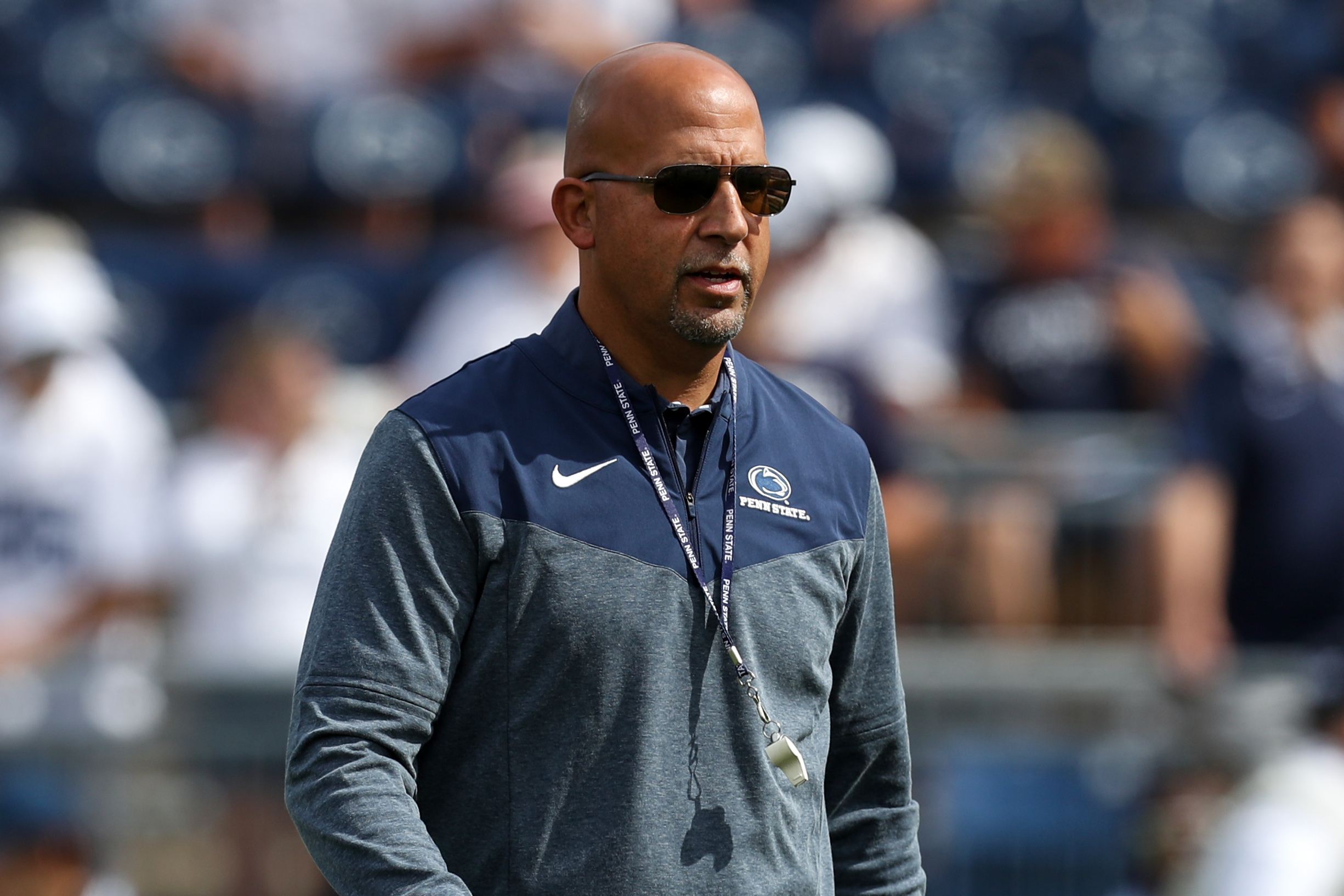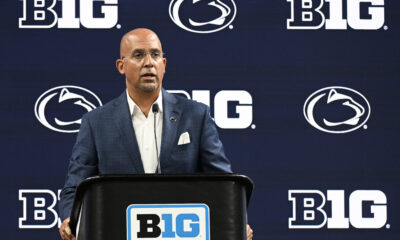Success in college football is hard. At times, it seems even harder to measure.
Yes, success can be quantified in wins, NFL Draft picks, and stat lines. But it also extends beyond the sidelines on fall Saturdays. There must be organizational buy-in from the nutritional, training, medical, equipment, and support staffs, many of whom work in complete obscurity to most of us.
In today’s landscape, the buzzword “alignment” must exist within the athletic department, the university, and the community. It certainly puts a new twist on the phrase “it takes a village.”
The coordination needed to pull off this level of success is difficult to attain. But even without metrics, it can be easy to spot. We know it when we see it – championship culture. It separates those at the pinnacle of our sport from everyone else.
And James Franklin and Penn State football are building a championship culture of their own.
One size fits all?
It may be easy to think there is but one path to building a championship culture. But the reality is it’s unique to every program.
The most prominent example is, of course, Alabama. Nick Saban has made a legacy of turning football players into trained assassins. For the Crimson Tide, the pursuit of excellence seems more important than the excellence itself. At times, it can make you wonder if they even enjoy winning.
At the complete opposite end of the spectrum, there’s Dabo Swinney and Clemson. Over the last decade, Dabo has built a “bring your own guts” championship culture that feels equal parts family and football program. Even at their worst, the Tigers still have run roughshod over the ACC.
The new kids on the block are the Georgia Bulldogs. Kirby Smart has quickly built an “us against the world” mentality in Athens. I mean, really, did anyone think that Georgia was going to only win seven games this year? At any rate, it worked. The Bulldogs are the first team to win back-to-back national championships since Saban and the Tide accomplished this a decade ago.
But, regardless of the variety, there are core tenants that all these cultures have in common.
Championship cultures can overcome adversity – not just from game to game, but over time. A championship culture doesn’t fall apart after one or two “unsuccessful” seasons. In fact, they redefine what the word “success” means entirely.
Championship cultures are unselfish. Individual accomplishments still matter but are often a side effect of the success of the collective unit. It’s the ultimate “we over me” mentality.
Championship cultures exhibit extreme organizational commitment. These programs attract and retain talent because people want to be a part of something bigger. This applies to talent both on and off the field. As a result, the culture breeds a peak level of competition.
Where is Penn State?
Penn State is closer to attaining a championship culture than the program has ever been under James Franklin. If it wasn’t clear before, the 2022 season showed just how close the Nittany Lions are to taking that next step.
Overcoming adversity
In 2022, Penn State overcame adversity. At the macro level, the program bounced back from a bottoming out in 2020 and 2021. Keep in mind this program went from winning 11 games in 2019 to 11 games overall in the last two seasons.
The Nittany Lions overcame in-season adversity as well. We don’t need to relive the Michigan and Ohio State matchups other than to say the losses were crushing. But Penn State teams in the past have let outcomes like that linger, losing more games as a result.
In 2022, Penn State responded to two devastating defeats in October by finishing the season on a five-game winning streak where it outscored its opponents 200-61. Penn State played teams it should beat and did beat them – handily. That’s what dominant programs do. The Nittany Lions also rose to the challenge against PAC-12 Champion Utah in the Rose Bowl, securing James Franklin’s first top-ten win since 2016.
Unselfishness
Penn State played unselfish football in 2022. There are numerous instances I could cite here. Still, the best example comes from two of the newest additions to the program.
True freshmen Nicholas Singleton and Kaytron Allen took the Penn State running back room by storm this fall. They dominated much of the Big Ten as well.
Singleton and Allen finished 5th and 11th, respectively, for total rushing yards among Big Ten running backs this season. But Penn State’s backs accomplished this on significantly fewer snaps. On average, Singleton and Allen had roughly 70 fewer carries than the average of the other top ten leading rushers in the Big Ten.
Both Singleton and Allen could be premiere backs at practically any program in the country, let alone the Big Ten. Either tailback would have been a top-five rusher in the Big Ten this season if they received the same workload as the conference’s other leaders.
But, to the outside world, Singleton and Allen seemed fine sharing the workload. The winter transfer portal season came and went, but both running backs are still Nittany Lions. The competition drives both to be better, but not at the expense of each other or the team. As a result, Penn State’s running game became the offense’s focal point by the season’s end.
Organizational commitment
Penn State’s budding championship culture is most evident from its top to bottom organizational commitment.
The Nittany Lions retained a remarkable amount of talent from the 2022 roster. Yes, the program did lose some top-tier talent to the NFL Draft, such as Parker Washington and Joey Porter, Jr. Honestly, those departures were expected. But Penn State kept several players that would have been solid middle-round draft picks this spring. That same thing could not have been said this time last year.
Penn State also retained several impact playmakers projected to be early-round draft picks, including Olu Fashanu, Curtis Jacobs, and Adisa Isaac. In almost all these decisions, a motivating factor was the opportunity to accomplish more as a collective unit.
And if that wasn’t enough, James Franklin added key transfer portal additions like Storm Duck, Dante Cephas, and Malik McClain.
In particular, McClain’s addition highlights a critical shift outside the Lasch Building. Malik McClain committed to the program and started classes after Penn State’s add/drop deadline for the Spring 2023 semester. This might not be a big deal on most campuses, but it marks a significant change at Penn State. To put it bluntly, I don’t think this scenario happens a year ago.
This is the most recent example of Penn State’s new leadership and its commitment to a championship culture. From Old Main and beyond, it finally feels like everyone is pulling in the same direction in Happy Valley. Franklin has acknowledged on several occasions that the newfound buy-in has allowed him to spend more time on football and less time advocating for the program.
In 2022, the results spoke for themselves.
What’s left for James Franklin?
Now, I’ve said many things here. But there are a few that I’m not saying.
I’m not saying that Penn State is currently on the level of Alabama, Georgia, or Clemson. It likely never will be, as each championship culture takes a shape of its own.
I’m also not saying that the Nittany Lions are destined to make the College Football Playoff in the near future. Success is hard and doesn’t happen in a vacuum. Penn State may be on the rise, but other contenders are as well.
And I’m not saying James Franklin has nothing left to prove. Far from it. If Penn State is to take the next step, then James Franklin will have to accomplish feats that he has not done in almost a decade with the Nittany Lions. The road ahead is clear, and it runs through Columbus and Ann Arbor.
But now, more than at any other point in the James Franklin era, Penn State has the opportunity and ability to do something special. We all can see it. But unlike in the past, where expectations have felt like the metaphorical albatross, they now seem to fuel the program’s ascendance.
And that’s what championship cultures do.

 FOOTBALL3 days ago
FOOTBALL3 days ago
 FOOTBALL2 days ago
FOOTBALL2 days ago
 FOOTBALL2 days ago
FOOTBALL2 days ago
 FB RECRUITING2 days ago
FB RECRUITING2 days ago
 WRESTLING2 days ago
WRESTLING2 days ago
 FB RECRUITING1 day ago
FB RECRUITING1 day ago
 WRESTLING3 days ago
WRESTLING3 days ago
 FB RECRUITING21 hours ago
FB RECRUITING21 hours ago












